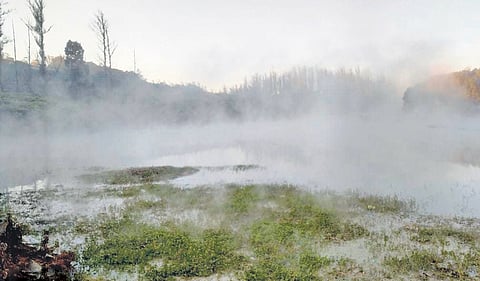

NILGIRIS: Forest managers are concerned about the sharp drop in temperature and the looming threat of forest fires in the Nilgiris district, particularly in Mukurthi National Park and Avalanche, where grasslands are drying up rapidly due to frost.
The night temperature dropped to 2°C in the last week of December. On January 4, it was recorded at 2.6°C, and it has not increased since then. S Balachandran, from the Regional Meteorological Centre in Chennai, told TNIE that the state recorded 27% more rainfall during both monsoon seasons this year.
Due to the high daytime temperatures, moisture in the soil evaporates during the night, and the absence of clouds at night exacerbates the frost cover, he added.
While staff at the Government Botanical Garden (GBG) are spraying water on the grass in the mornings and evenings to protect it from frost, it is challenging for forest managers to do the same across thousands of acres of grasslands. As a result, the grass will dry up once the temperature rises, and the friction could trigger fires in the forests. The frost has also impacted farmers and tea planters.
From 5 pm to 9 am, the cold is intense, keeping people indoors, which has slowed farming activities. In areas like Thalikundha, water bodies are on the verge of freezing. C Narayanan from Gandhi Kandi village in Avalanche stated that they are experiencing severe cold during sunrise. "Earlier, we used to visit our fields before 6.30 am, but now we only go out after 8 am," he said. "Out of ten acres of land, I have cultivated tea on seven acres and vegetables like carrots, beans, and potatoes on three acres. The tea leaves and carrot shoots have started to dry up, and it will be a challenge to save them in the coming months," he added.
As tea cultivation will be affected in the next six months due to the inclement weather, small planters have appealed to the Tea Board and the district administration to announce compensation for crop losses.
S Raman, president of Nelikolu (meaning "starting a fire by rubbing two sticks" in the Badaga language), said that apart from Kotagiri, Gudalur, and Coonoor, the most affected tea cultivation areas are in Ooty and Kundha.